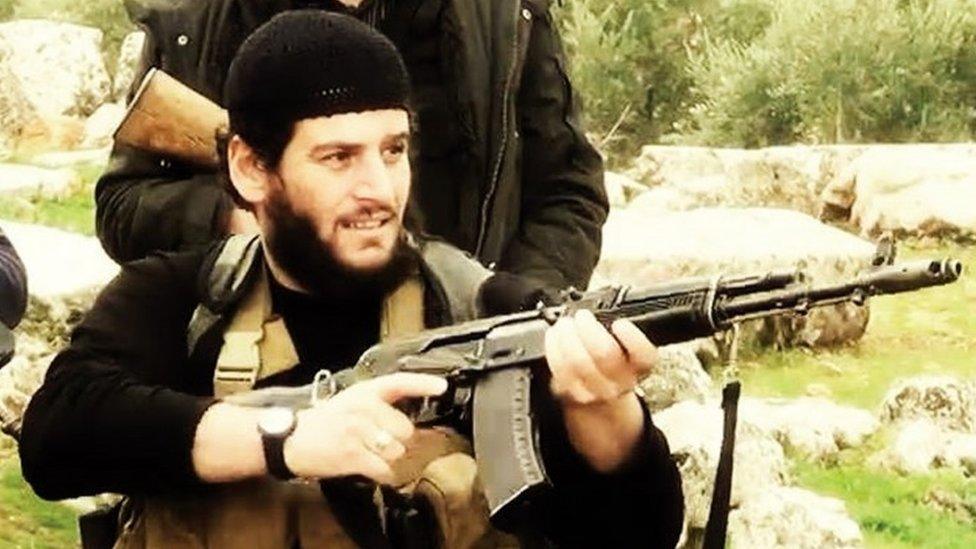Islamic State: Abu Muhammad al-Adnani 'killed in Aleppo'
- Published

Adnani was mostly known for his calls for lone-wolf attacks in the West
The chief strategist of the Islamic State group, whose calls for attacks against the West and during Ramadan led to mass bloodshed, has been killed in Syria, IS-affiliated media say.
The Amaq news agency said Abu Muhammad al-Adnani died in Aleppo province.
The Pentagon said an air strike had targeted Adnani in the town of al Bab and the results were being assessed.
Reports of his death come as IS is suffering a series of military reverses in both Syria and Iraq.
Adnani - who was also the group's spokesman - was "martyred while surveying the operations to repel the military campaigns against Aleppo", Amaq said, without giving details about how he died.
Fighting has escalated around the city in recent weeks, with rebels breaking a siege by government forces and Syrian and Russian warplanes bombing rebel-held areas.
Islamic State group - the full story
Is besieged Aleppo facing last gasp?
In a statement, Pentagon spokesman Peter Cook described Adnani as the "principal architect of Isil's external operations", using an alternative name for the group.
He had "co-ordinated the movement of Isil fighters, directly encouraged lone-wolf attacks on civilians and members of the military and actively recruited" new members, Mr Cook said.
He added: "We are still assessing the results of the strike, but al-Adnani's removal from the battlefield would mark another significant blow to Isil."

Analysis by BBC security correspondent Frank Gardner
For a proscribed terrorist organisation that has long placed propaganda at the centre of its global strategy, the death of IS's chief spokesman is a significant blow.
For the past two years Abu Muhammad al-Adnani had been making strident calls for attacks on the citizens of Western and other countries, notably France. His call to intensify attacks on IS's enemies this summer resulted in one of the bloodiest months of Ramadan in recent memory.
As with all terrorist organisations, he is easily replaceable. But for IS, Adnani possessed a valuable blend of effective oratory and military experience. Amongst IS followers he was well known and widely listened to.
His reported death is a further blow to a movement that is now under enormous pressure on all sides.

One of the group's founder members, he was born Taha Sobhi Falaha in the northern Syrian town of Banash in 1977 and had a US bounty of $5m (£3.82m) on his head.
In June 2014, he formally declared the establishment of the IS caliphate stretching across parts of Syria and Iraq under the leadership of Abu Bakr al-Baghdadi, demanding allegiance from Muslims worldwide.
He went on to release audio recordings urging lone-wolf attacks against civilians in nations that supported the US-led coalition against IS.
Earlier this year, he called for attacks during Ramadan, with followers carrying out attacks including the Orlando nightclub shooting, the truck attack in the French city of Nice and a massive suicide bombing in Baghdad.

'Unusually quick': By Mina al-Lami, jihadist media analyst, BBC Monitoring
IS's announcement of the death of Adnani came unusually quickly - the same day as the US military operation in which he is assumed to have died. It pre-empted any reports by the US military or the media.
It is not customary for IS to acknowledge the killing of its top figures immediately. Deaths are often confirmed belatedly and indirectly, for example by naming a military campaign after the deceased leader.
But none of the leadership figures killed recently had the same standing in the group's own media. Aside from IS leader Abu-Bakr al-Baghdadi, Adnani was the only other public face of IS - a group generally highly secretive about its leading members while they are alive.

Adnani was last heard in an audio message in May urging Muslims to carry out attacks in the West.
US officials also say, external he was one of the first foreign fighters to oppose the presence of US-led forces in Iraq after the 2003 invasion.
